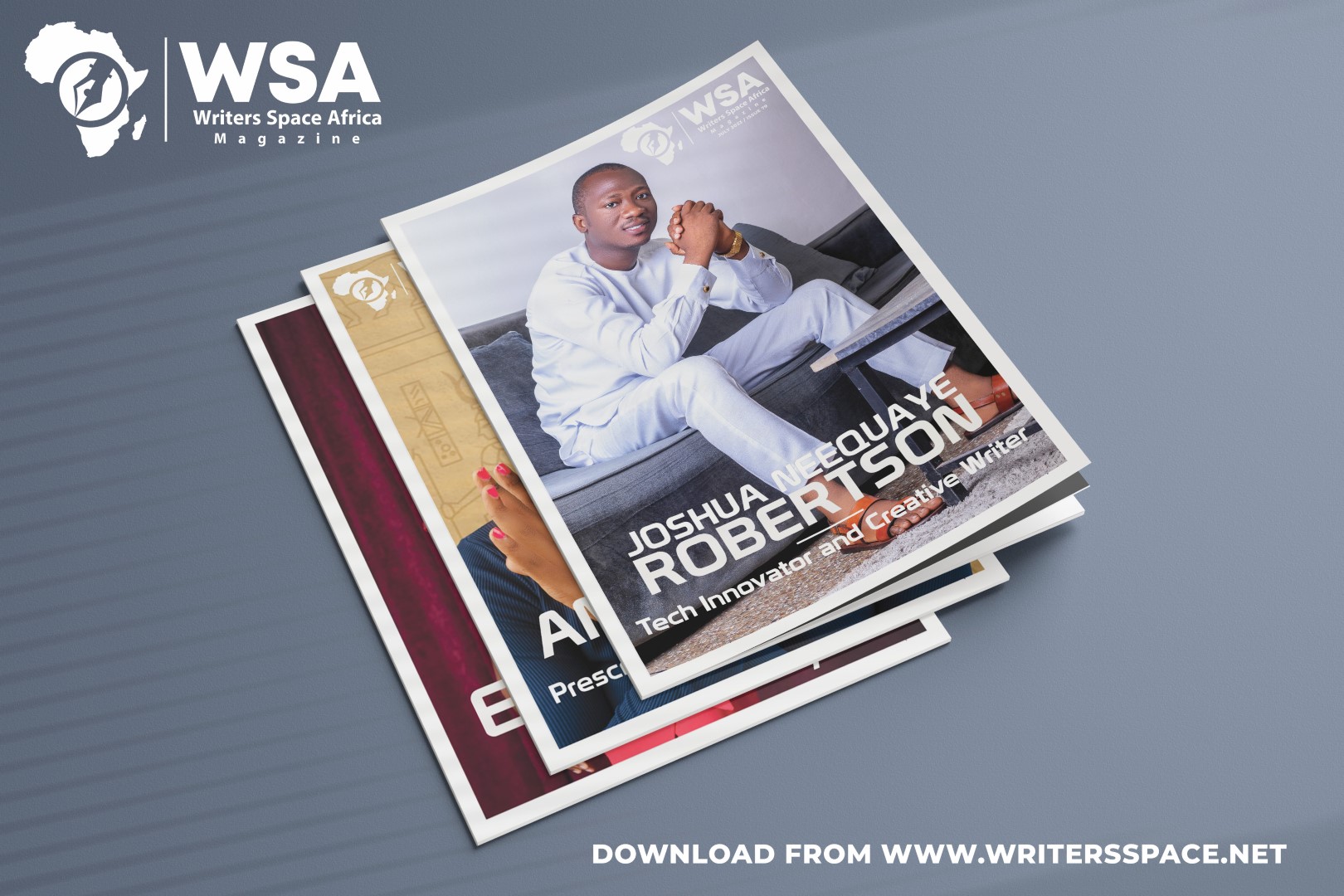In this exclusive interview, I had the pleasure of speaking with Joshua Neequaye Robertson, an incredibly talented writer from Ghana. Notably, Joshua achieved the prestigious title of the 2nd runner-up in the renowned Wakini Kuria Prize for Children’s Literature in 2022. Together, we explore his journey, his inspirations, and his remarkable accomplishments in the world of literature. So, join me as we embark on an insightful conversation with Joshua Neequaye Robertson, a rising star in the realm of African children’s literature. – PPBlessing

PPBlessing: Let’s begin with a brief introduction. Who is Joshua?
JNR: Joshua, born and raised in Accra is the third of four children in his family. He embarked on his educational journey at Happy Home Academy, where he completed his Junior high school studies. Then he continued to West Africa Senior High School for his high school education. And later on, to Wisconsin International University College, Ghana where he recently completed with a bachelor’s degree in Information Technology. He is currently a mentee in an artificial intelligence firm and a creative writer intern at a digital storybook company, all in Accra.
PPBlessing: How are you able to combine being a tech Bro with writing?
JNR: Of course, that’s a very challenging one because both are quite demanding. It takes a lot of self-discipline. And moreover, my passion for both propels me.
PPBlessing: What do you do as an artificial intelligence mentee?
JNR: I am actually under training for a role in Data labelling, which is a branch of machine learning.
Machine learning involves teaching computers to learn from data and make predictions or decisions without being explicitly programmed. It’s like teaching a computer to recognize patterns and make intelligent choices based on examples it has seen before.
PPBlessing: How has it been so far?
JNR: Well, it has been exciting literally because I have always been fascinated by how computers are used to solve problems and simplify complex tasks. And I’m really happy to be part of this AI revolution that is plunging the world into a whole new era.
PPBlessing: What’s your take on the impact of AI on writing?
JNR: AI has the potential to make African storytelling even more exciting in the future. With AI, stories can be interactive, where readers can choose what happens next. It can also help create virtual or augmented reality experiences, where people can feel like they are inside the story. That would make storytelling more engaging and help present African cultures and traditions in new and immersive ways.
PPBlessing: Do you think writers who fear AI taking over their careers have a valid fear?
JNR: Well, I think their fear is valid to some point because AI is now being used to automate certain writing tasks and generate content. However, AI generated content often lacks that depth and originality that human writers bring to the table. Writers usually have that authenticity and personal connection that makes their writing unique. So I don’t think AI can replace writers entirely.
PPBlessing: When did you start writing and why do you still write?
JNR: I can’t recall exactly when but I started writing at quite a young age. And it was actually just for the love of writing and storytelling. I still write because it brings me joy. I think it has something to do with purpose. Secondly, writing allows me to express my thoughts, emotions, and ideas in a way that transcends time and space. Through writing, I have the power to create new worlds, breathe life into characters, and share stories that can touch hearts and minds. It is also a form of self-expression that enables me to communicate my deepest passion, fears, and aspirations.
PPBlessing: Could you share some of the things you would like to achieve as a writer?
JNR: As a writer, I want to leave my readers feeling inspired, encouraged, and empowered to overcome obstacles and pursue their dreams. Secondly, I seek to bring awareness to important social issues and promote positive change.
I also want to use my platform to amplify marginalized voices, advocate for social justice, and contribute to building a more inclusive and compassionate world – a world as rich and diverse as the colours of Ghana’s kente cloth.
PPBlessing: What’s the meaning of your middle name, Neequaye?
JNR: It’s actually linked with my clan. In our clan, there exists a tradition that connects us across generations. It involves naming the first male child either Neequaye or Kotey, and this naming pattern continues in a recurring manner. Specifically, the first boy child of the Kotey lineage is given the name Neequaye, while the first son of Neequaye’s descendants is named Kotey. This tradition symbolizes our strong bond with our lineage and ensures a sense of continuity within our clan.
PPBlessing: That’s interesting… Aside Children’s literature and flash fiction, what other genres do you write?
JNR: I have been experimenting with poetry but I feel more comfortable with these, most especially, children’s literature. However, I am working on a collection of short stories for children which I hope to publish in the near future.
PPBlessing: How near is this future?
JNR: I can’t tell exactly because I have two exciting short stories now and I hope to add some more before I go ahead to publish.
PPBlessing: How do you plan to publish? By yourself or through a publishing company?
JNR: I would like to self-publish.
PPBlessing: Which writers have influenced your writing the most?
JNR: I would say the award-winning children’s book writer/illustrator from Ghana, Meshack Asare. His ability to depict the imagery of Africa in his writing is truly awe-inspiring. It’s amazing how his style of writing hijacks all the five senses and transports readers into another world, making them feel connected to the story. I don’t know, but for some reason, I think he has not received the level of celebration he truly deserves.
PPBlessing: That’s wonderful. What level of celebration do you think he deserves?
JNR: I’m not really sure but probably an award scheme for young writers or something could be instituted in his name to continue his legacy as he ages and to encourage more young people to take up a career in children’s book writing and publishing.
PPBlessing: Let’s talk about emerging 2nd runner up for Wakini Kuria prize for Children’s literature. How was that for you?
JNR: Oh my goodness! It was a whirlwind of emotions. I can’t even describe how it felt at that moment. Like a rollercoaster ride, with excitement and disbelief swirling around inside me. I mean, I worked so hard for it but I still couldn’t believe I had won.
PPBlessing: Congratulations once again. Have you won any award before then?
JNR: No. That was actually my first award.
PPBlessing: What impact has winning the award had on you as a person and on your writing?
JNR: Winning the award has boosted my confidence and validated my writing abilities. I mean, being recognized by esteemed judges is something one should be proud of. Furthermore, it has deepened my sense of purpose and dedication to my craft. It has been a reminder that hard work pays.
PPBlessing: What inspired your winning story, Grandma’s needlework?
JNR: It all started when I saw a neighbour praying with her daughter before leaving for school. It took me back to when my mother prayed with me every morning before leaving for school. I remembered how I actually didn’t want to go, sometimes, because I had this phobia for mathematics. I sometimes had to fake sickness in order to skip school, especially on Wednesdays because we had maths drills in the morning.
PPBlessing: Aha! How did you get to overcome the phobia and study information technology?
JNR: After watching the movie, “Like stars on earth.” That movie really inspired me because my story was quite similar to that little boy’s. I had a change of mind and a surge in energy. It was just a problem of mindset. My father got me an extra classes teacher who also helped me bountifully.
PPBlessing: What is one thing you would want to see happen in the African literary front?
JNR: I want to see a united front because it is through unity we can overcome our challenges and make a significant impact. Most African creatives don’t know where to turn to or the institution to contact when they need an information or collaboration or something. Everything seems scattered all around.
I think the honourable PenBoss and the African Writers Conference have done extremely well to establish something like this to unite the agents of African literary every year.
PPBlessing: This is definitely essential. It is part of what we are doing at Writers Space Africa. Creating the needed platform for African Writers to interact and collaborate.
Have you been mentored as a writer?
JNR: I got a mentor when I joined the creative writing internship early this year.
PPBlessing: How has that been so far?
JNR: It has been an invaluable experience. The guidance, support and wealth of knowledge is overwhelming.
PPBlessing: If you were to live in a book setting, in which book and town will you be?
JNR: Ayesha Haruna Atta’s book, Harmattan rain.
It has been a pleasure to have you with us for this interactive interview. We hope you enjoyed reading and sharing the Writers Space Africa magazine. See you next month.
Read – Blessing Amatemeso – Prescriptions from a Creative Soul







